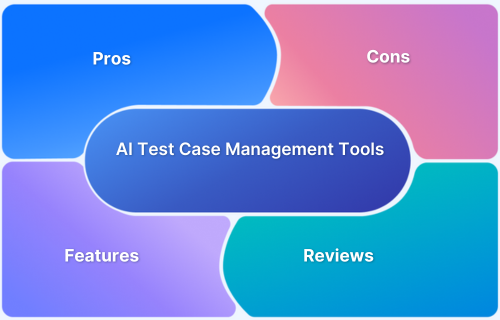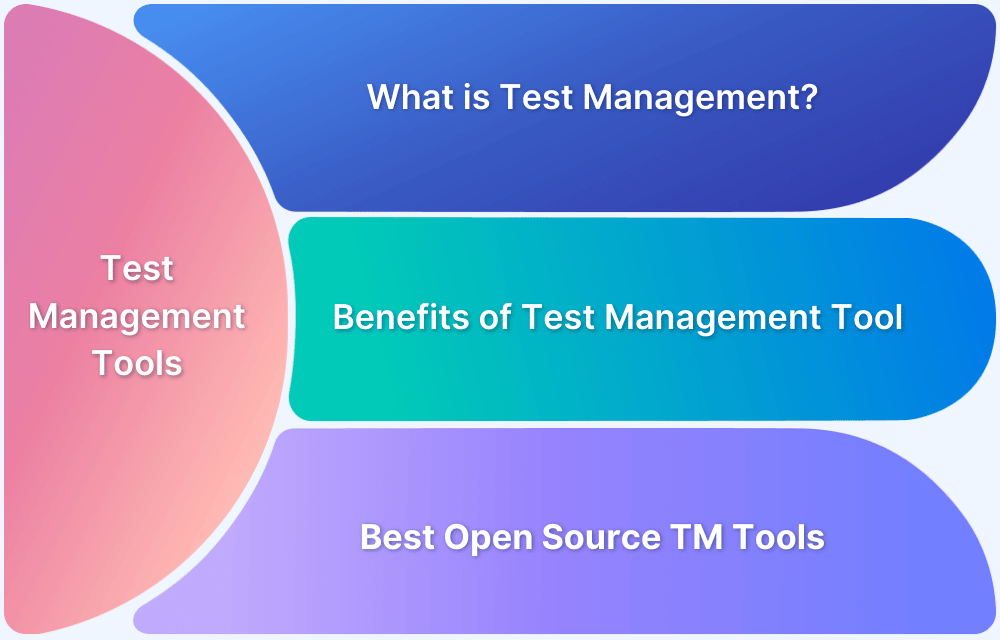AI test management leverages artificial intelligence to automate and enhance software testing processes. It handles tasks like generating, optimizing, and maintaining test cases, performing predictive analytics, and self-healing flaky tests.
Overview
How AI Enhances Test Management:
- Test Case Generation: Auto-creates test cases from requirements or user stories.
- Test Optimization: Prioritizes high-risk tests and maximizes coverage.
- Self-Healing Tests: Updates scripts automatically when UI changes.
- Predictive Analytics: Identifies defects and provides actionable insights.
- Efficiency: Reduces repetitive tasks, letting QA focus on complex testing.
Top AI Test Management Tools
- BrowserStack Test Management: AI-powered platform for faster test creation, execution, and coverage with seamless integrations and dashboards.
- Testomat.io: AI-driven test management with strong CI/CD integration and collaboration features, ideal for streamlined workflows.
- Testers.ai: Automates web testing across accessibility, performance, and UI/UX with adaptive AI agents.
- Qase: Centralized platform for managing manual and automated tests with clear visibility and collaborative features.
- PractiTest: End-to-end test management with customizable workflows, traceability, and AI-assisted test optimization.
- Testmo: Unified workspace for manual, automated, and other tests with CI/CD and issue tracker integration.
- Zephyr: Jira-integrated test management with AI-assisted steps, self-healing locators, and traceability for agile teams.
This article gives a comprehensive understanding of AI in test management, challenges, best practices, and some of the popular AI test management tools.
What is AI Test Management?
AI Test Management is the practice of using artificial intelligence and machine learning to automate, optimize, and improve the software testing lifecycle.
It goes beyond traditional test management by analyzing patterns in test data, predicting potential defects, and suggesting smarter test coverage.
AI can improve efficiency by automatically generating and mapping test cases according to the needs, reducing manual effort and human error.
Role of AI in Test Management
Here are some of the important roles that AI plays in test management:
- Automated Test Case Generation: AI analyzes application behavior and past defects to automatically create and update relevant test cases.
- Defect Prediction: Uses previous data and trends to predict high-risk areas in code where bugs are most likely to occur.
- Smart Test Prioritization: Helps teams focus on important tests first by ranking them based on impact, frequency, and recent code changes.
- Intelligent Reporting & Insights: AI analyzes large volumes of test results, highlighting patterns, failures, and root causes faster.
- Continuous Optimization: Learns from each test cycle to improve accuracy, reduce duplication, and enhance overall test efficiency over time.
Also Read: AI Test Case Generation Guide
Benefits of AI in Test Management
Some of the core benefits offered by AI in test management are:
- Automates repetitive tasks, reducing the time spent on planning, execution, and reporting.
- Minimizes human error in test case creation, mapping, and result analysis.
- Provides strong data insights that help QA teams prioritize effectively and improve release quality.
- Early defect prediction before any kind of release and risk analysis leads to more stable releases.
- Learn from historical data to refine testing strategies and optimize workflows with every iteration.
Why Use AI Test Management Tools?
AI test management tools help QA and dev teams to improve their overall process of test quality management. Instead of just tracking tests, they help to predict failures, prioritize efforts, and continuously improve processes.
For organizations using DevOps or continuous delivery, these tools help in fast development and reliable quality assurance.
Ultimately, using AI in test management is not just about automation; it’s about intelligence and adaptability. It maintains your testing process with agile development cycles, frequent releases, and complex product ecosystems.
Top AI Test Management Tools
Here are some of the most popular AI test management tools along with their key features, and our verdict on choosing them for what purpose.
1. BrowserStack Test Management
BrowserStack Test Management is an AI-powered, unified platform designed to accelerate test case creation, execution, and automation with up to 90% faster test authoring and 50% improved coverage.
It offers seamless integrations, real-time visibility through customizable dashboards, and advanced AI agents that streamline testing workflows for both manual and automated tests.
Built for teams of all sizes, it ensures secure data handling while enabling high-quality, efficient software delivery.
Key Features
- AI-Powered Test Case Creation: Automatically generate comprehensive test cases from Product Requirement Documents (PRDs), user stories, or text prompts. AI also suggests enhancements to existing test cases, reducing manual effort significantly.
- Test Deduplication Agent: Detects exact or semantically similar test cases across your repository, providing intelligent recommendations for merging or removal to maintain a clean and efficient test suite.
- Low-Code Automated Test Authoring: Quickly convert manual test cases into low-code automated tests to accelerate automation adoption without requiring deep coding skills.
- Intelligent Test Selection Agent: Uses AI to identify and recommend the most relevant tests for execution, optimizing test runs and focusing on critical test coverage.
- Unified Test Management: Manage all manual and automated test cases in one centralized platform with full traceability from requirements to defects through seamless integrations with Jira, Azure DevOps, and more.
- Powerful Dashboard Analytics: Access customizable dashboards that offer real-time insights, track release status, monitor historical trends, and visualize testing metrics, including automation coverage.
- Support for 50+ Automation Frameworks & CI/CD Tools: Integrates with popular frameworks (Appium, Playwright, TestNG, etc.) and CI/CD platforms (Jenkins, Azure Pipelines, Bamboo), enabling scalable test automation workflows.
- Shared Steps for Reusability: Mark repetitive test steps as shared within test cases to enhance reusability and save effort when creating or maintaining test cases.
- Quick Import & Custom Field Mapping: Import test cases rapidly from CSV files or existing management tools with automatic field mapping and on-the-fly custom field creation.
- AI-Powered Jira App with Two-Way Binding: Synchronize test cases and runs between BrowserStack Test Management and Jira, allowing management from both platforms with AI-driven assistance.
- Streamlined Manual and Automated Test Runs: Plan and execute test runs across manual and automated tests. Supports dynamic test inclusion and uploading automation results from frameworks like JUnit and BDD-JSON.
Why Choose BrowserStack Test Management?
It is ideal for teams looking for a scalable and reliable platform that fits perfectly into existing workflows. It improves efficiency and accuracy by using AI to prioritize and optimize testing efforts. The platform also offers clear visibility and accountability across all test cycles, supporting better decision making and faster releases.
The free version of BrowserStack Test Management offers unlimited test cases, robust integrations, and real-time reporting capabilities.
Try BrowserStack Test Management
2. Testomat.io
Testomat.io is an AI test management platform designed to manage both manual and automated testing workflows. It offers features like AI-powered test generation, effective CI/CD integration, and advanced reporting features.
The platform aims to improve collaboration among QA teams, developers, and non-technical stakeholders, providing real-time insights and analytics.
Key Features:
- Uses AI to automatically generate test cases for improving coverage and efficiency.
- Integrates smoothly with popular CI/CD tools, supporting continuous testing and delivery.
- Provides detailed reports and analytics to track test progress and identify areas for improvement.
- Supports collaboration among team members, allowing for efficient test planning and execution.
Verdict:
It is a good platform for teams looking for AI based test management solutions with strong CI/CD integration, but it doesn’t offer cross-browser testing features and real-device access, which other premium tools do.
Also Read: 13 Best Test Management Reporting Tools
3. Testers.ai
Testers.ai is an AI-powered test management platform designed to automate and improve the software testing process. It uses advanced AI agents to perform detailed web application testing with minimal manual changes.
The platform maintains proper testing workflows, ensuring software quality across multiple categories such as accessibility, performance, responsive design, etc.
Key Features:
- Uses AI agents to perform thorough web application testing with minimal manual effort.
- Adapts automatically to changes in UI, HTML structure, and network behavior.
- Checks accessibility, performance, UI/UX consistency, responsive design, privacy, and security.
- Works with IDEs and CI/CD tools for smooth workflow integration.
Verdict:
If the goal is to use AI for automated test management and gain insights across accessibility, performance, and UI/UX, Testers.ai is a strong choice. However, teams needing advanced test coverage across multiple environments and browsers or large-scale testing integration may find it limiting compared to other tools.
4. Qase
Qase is a modern test management platform that helps teams to organize, track, and execute test cases efficiently. It provides a centralized workspace for managing both manual and automated tests. With features like test runs, plans, and dashboards, Qase allows teams to collaborate effectively and make>
6. Testmo
Testmo is a unified AI test management platform that brings together manual, automated, and other kinds of testing in one workspace. It integrates perfectly with CI/CD tools, issue trackers, and test automation frameworks. The interface is clean and modern, helping QA teams to streamline test runs, track progress, and maintain full visibility over quality metrics.
Key Features:
- Create, organize, and execute test runs with advanced filtering, tagging, and prioritization options.
- Automatically import results from popular frameworks like Playwright, Cypress, or JUnit with minimal setup.
- Supports custom fields and workflows to match the current QA process.
- Natively integrates with tools like Jira, GitHub, GitLab, and Slack for issue tracking and updates.
Verdict:
This tool is good for teams looking to integrate various testing types under one scalable platform without any heavy setup or maintenance costs. But it doesn’t offer deep native analytics and automation control like other popular testing tools.
Learn More:Xray Alternatives for Test Management
7. Zephyr
Zephyr is a test management solution by SmartBear which integrates effectively with Jira and supports both manual and automated testing workflows. It offers features like AI assisted test step suggestions, auto-generated validations, and self-healing locators to improve efficiency. With high level traceability and real-time reporting, Zephyr aims to centralize QA processes for agile and enterprise teams.
Key Features:
- Link test cycles under test plans to monitor release level progress and aggregate metrics.
- Uses AI to suggest test steps, validations, and self-healing locators for automated tests.
- Real-time sync with Jira for issue linking, traceability, and visibility across development workflows.
- Maintain a shared test library across projects, support reuse of test cases, and manage large test volumes.
Verdict:
This tool is good for organizations already embedded in the Jira ecosystem that want easy test planning, execution, and traceability. But it doesn’t provide deep level built-in analytics, modeling, or automation control as dedicated test reporting or automation framework platforms.
Read More: Zephyr Alternatives for Test Management
Importance of Choosing the Right AI Test Management Tool
Selecting the right AI test management tool is crucial for faster releases, higher accuracy, and improved collaboration across QA and development teams.
AI-driven platforms do more than track tests; they learn from them to:
- Predict failures and optimize test coverage
- Detect patterns and identify high-risk areas
- Reduce redundant testing
- Continuously improve software quality
BrowserStack Test Management stands out as a unified, intelligent platform that combines automation, insights, and scalability for modern software teams. It offers a single interface for managing both manual and automated tests, seamless integration with CI/CD pipelines, issue trackers, and test frameworks, and enterprise-level workflow support with real-time reporting.
Its easy setup and scalable solutions make it ideal for teams looking to improve efficiency and software quality.
Challenges in Implementing AI Test Management
Here are some of the major challenges associated with AI Test Management:
- AI tools need clean, labeled, and consistent test data so issues here can reduce the accuracy of predictions and insights.
- Connecting AI systems with existing CI/CD pipelines and automation frameworks can be difficult without breaking workflows.
- Teams may face resistance or lack the necessary skills when shifting to AI testing workflows and data-centric decision making.
- Limited visibility into how AI models make predictions can make it harder to build trust in their results.
- Keeping AI models updated and effective as test data and project scope grow need ongoing technical effort.
Best Practices for Adopting AI Test Management
Some of the best practices to be followed while using AI Test Management are:
- Start with pilot projects to understand the core AI features and refine workflows before full-scale adoption.
- Maintain continuous feedback between testers, developers, and AI outputs to improve accuracy and relevance.
- Integrate AI tools deeply with existing automation frameworks and CI/CD pipelines for effective execution.
- Regularly update AI models with new test data to make sure that predictions remain accurate and actionable.
- Monitor key metrics like defect detection rates and test coverage to measure ROI and bring improvements.
Conclusion
Using AI Test Management can improve QA efficiency, test coverage, and overall software quality when done correctly. Choosing the right platform, integrating it smoothly into existing workflows, and using AI-based insights makes sure that testing is smarter, faster, and more reliable.
By addressing common challenges and using all in one platform like BrowserStack Test Management, teams can optimize their testing process, reduce manual effort, and speed up releases without compromising on quality.







